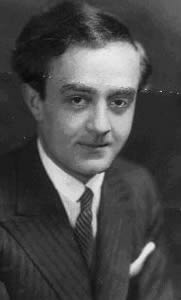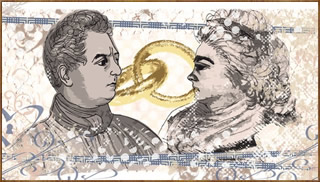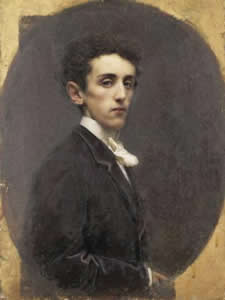De Jamaicaanse dichter Louis Simpson werd geboren op 27 maart 1923 in Jamaica. Zie ook mijn blog van 27 maart 2009 en ook mijn blog van 27 maart 2011.
Carentan O Carentan
Trees in the old days used to stand
And shape a shady lane
Where lovers wandered hand in hand
Who came from Carentan.
This was the shining green canal
Where we came two by two
Walking at combat-interval.
Such trees we never knew.
The day was early June, the ground
Was soft and bright with dew.
Far away the guns did sound,
But here the sky was blue.
The sky was blue, but there a smoke
Hung still above the sea
Where the ships together spoke
To towns we could not see.
Could you have seen us through a glass
You would have said a walk
Of farmers out to turn the grass,
Each with his own hay-fork.
The watchers in their leopard suits
Waited till it was time,
And aimed between the belt and boot
And let the barrel climb.
I must lie down at once, there is
A hammer at my knee.
And call it death or cowardice,
Don’t count again on me.
Everything’s all right, Mother,
Everyone gets the same
At one time or another.
It’s all in the game.
I never strolled, nor ever shall,
Down such a leafy lane.
I never drank in a canal,
Nor ever shall again.
There is a whistling in the leaves
And it is not the wind,
The twigs are falling from the knives
That cut men to the ground.
Tell me, Master-Sergeant,
The way to turn and shoot.
But the Sergeant’s silent
That taught me how to do it.
O Captain, show us quickly
Our place upon the map.
But the Captain’s sickly
And taking a long nap.
Lieutenant, what’s my duty,
My place in the platoon?
He too’s a sleeping beauty,
Charmed by that strange tune.
Carentan O Carentan
Before we met with you
We never yet had lost a man
Or known what death could do.

Louis Simpson (Jamaica, 27 maart 1923)
De Hongaarse schrijver en filmmaker Lajos Zilahy werd geboren op 27 maart 1891 in Nagyszalonta, nu Salonta nabij Oradea. Zie ook alle tags voor Lajos Zilahy op dit blog.
Uit: Was mein Herz begehrt (Vertaald door Eta Neumann-Veith u. Andrea Seidler)
„Er erinnerte sich an vergangene Sonntagnachmittage, an denen ihn solche Ausflüge begeistert hatten. Er sah den Wald vor sich, die dunklen, geheimnisvollen Nester in den vom Blitz getroffenen kahlen Bäumen und hörte das Krächzen der Krähen, er sah das lehmige Wasser des kleinen Flusses,
die goldgrünen Schatten der Weiden und meinte sogar, das Glucksen des Schlamms in seinen löchrigen Schuhen zu hören.
All das währte nur einen Augenblick. Die Erinnerungen verflüchtigten sich ebenso rasch, wie sie gekommen waren. Mit krauser Stirn starrte er vor sich hin, verärgert über sein Unvermögen, die Zeit totzuschlagen. Die Leere und Sinnlosigkeit des Lebens wurde ihm plötzlich bewusst.
Als Gymnasiast hatte er es kaum erwarten können, das Abitur hinter sich zu bringen, als Student hatte
er gehofft, dass sich ihm nach dem Examen mit einem Schlag sämtliche Türen öffnen würden und dass sich hinter ihnen Glanz, Frauen, Leidenschaft und ihm noch unbekannte aufregende Dinge verbargen, die nur auf ihn warteten.
Und jetzt stand er auf der Straße und hatte weder Lust noch Kraft, sich eine Zigarette anzuzünden. Was würde ihm das Leben noch bringen?
Vorgestern hatte er das deutsche Kindermädchen der Familie Binz im Stiegenhaus umarmt und geküsst. Das betörend-süßliche Parfüm des Mädchens lag immer noch in der Luft. Er verdrängte den Gedanken. Seine Mutter wünschte sich eine Schwiegertochter.“

Lajos Zilahy (27 maart 1891 – 1 december 1974)
De Albanese dichter, schrijver en vertaler Andon Zako Çajupi werd geboren op 27 maart 1866 in Sheper. Zie ook alle tags voor Andon Zako Çajupi op dit blog.
Elegy To A Lost Youth
Oh sweet wife, your comfort’s dead –
can’t even raise his wrinkled head,
who was rampant night and day:
a stallion eager for the fray.
Alas! alack! O woe is me!
My mount is useless, as you see.
He who stood proud and erect
now can’t command the least respect.
A feral beast only last year,
village women made him rear
up when they showed a comely thigh
– and on he charged to do, not die.
He pranced through Europe east to west,
and always gave his perky best
to Irish red-heads, dusky Roms,
wispy maidens, buxom moms.
He’d make a seamstress lose her needle,
doll-like duchesses he’d wheedle,
tempt a cowgirl off the farm.
Feisty fishwives he could charm!
There was not a breed he missed
from trousered Tosk to dirndled Swiss
on pristine Alpine peaks –
even pious, racist Greeks –
until they yielded up their crannies,
(he cheered up many lonely grannies).
In France he had amazing luck:
queues would form to have a suck –
and when he went to Istanbul
great grown men desired that tool!
(They didn’t get it, but perhaps
I should have gratified those chaps…)
Oh, my poor neglected wife
your husband’s manhood has no life,
can’t give you pleasure any more
as once it did till it was sore.
A prominent, popular swell,
what he did he did right well.
Now old age has come to this:
he peeps out only for a piss.
Vertaald door Anthony Weir en Blerta Alikaj

Andon Zako Çajupi (27 maart 1866 – 11 juli 1930)
Het meer bij Sheper, Albanië
De Duitse schrijver en vertaler Harry Rowohlt werd geboren op 27 maart 1945 in Hamburg. Zie ook alle tags voor Harry Rowohlt op dit blog.
Uit: Der Kampf geht weiter
“Ein Jahr später: Aus einer ca 30000 Seiten umfassenden Lose- Blatt-Sammlung ist nun vorliegendes Buch entstanden. Der Plan dafür war längst in den Köpfen, denn seit Harry Rowohlt 1997 seine (vorläufig) letzte Kolumne in der ZEIT veröffentlichte, war des jammervollen Gezeters kein Ende: Warum SCHREIBT er nicht mehr? ER.
Tat er aber doch, wußten die Insider, er tat es bereits Jahrzehnte vor dem ersten Auftritt in der oben erwähnten Wochenzeitung, und zwar in Form von BRIEFEN, BRIEFEN, BRIEFEN.
Womit haben wir es nun zu tun? Mit Dokumenten von historischer Bedeutung? Mit intimen Bekenntnissen? Mit politischen Manifesten? Mal sehen.
Harry Rowohlt schreibt an sein »Brüderchen« und an seine Freunde, an die Autoren, die er übersetzt hat, und an seine Verleger; er schreibt an Buchhändler und Journalisten, er antwortet Leserbriefschreibern und Bittstellern. Er schreibt zärtlich und entzückt – oder erbost und (selten) unversöhnlich.
Da liegt der Hase im Pfeffer!
Einerlei, ob Ledig-Rowohlt oder Siegfried Unseld, ob Roger Boylan oder Frank McCourt, ob der anonyme »Lindenstraße «-Fan oder der berühmte Kollege U. die Adressaten sind: Der freie Geist und herausragende Stilist HR unterscheidet nicht zwischen Promi und No-name, er schert sich nicht um Konvention und Contenance; jeder erhält die ihm zugedachte Antwort.”

Harry Rowohlt (Hamburg, 27 maart 1945)
De Duitse dichteres en schrijfster Sophie Mereau (geb. Schubart) werd geboren op 27 maart 1770 in Altenburg. Zie ook alle tags voor Sophie Mereau op dit blog.
Schwärmerey
Wirst du mir stets den Seraphsfittig leihen,
du nektartrunkne, süße Schwärmerey?
Du wirst es nicht. – Verglimmen und zerrinnen
wird deine Gluth vor den getrübten Sinnen;
dein Wahnsinn bleibt dem kühlern Blut nicht treu.
Dies Saitenspiel, das rings mit Harmonieen
die ganze Erde magisch übergoß,
verrauscht und schweigt; die Phantasie verblühet,
der Lenz erbleicht, der Freude Gluth versprühet,
– ein Einz’ges nur bleibt ewig wechsellos!
Was nur allein des Zufalls Laune trotzet,
die schöne Blüthe reiner Menschlichkeit,
das uns allein zu freyen Wesen gründet,
woran allein sich unsre Würde bindet,
dies höchste Gut, es heißt – Selbstständigkeit.

Sophie Mereau (27 maart 1770 – 31 oktober 1806)
Clemens Brentano en Sophie Mereau
De Italiaanse schrijver Carlo Dossi werd geboren op 27 maart 1849 in Zenevredo in de provincie Pavia. Zie ook mijn blog van 27 maart 2009 en ook mijn blog van 27 maart 2011.
Uit: Une divinité secrète (Bespreking van „Amours“ door François Sureau)
„Amours est ce petit livre par lequel il a mis fin à 38 ans, en 1887, à sa carrière publique d’écrivain. Sa manière, à la fois détournée et naturelle, y atteint une véritable perfection. Dossi, qui n’aimait pas l’intrigue, retient son lecteur par une musique intime dont les phrases se détendent après de longues circonvolutions et frappent au coeur par une note de regret, de sensualité ou de drôlerie. Il décrit une succession de ciels, coupés de retour sur terre. Au premier ciel, les amours enfantines; au deuxième, les meubles qui rappellent l’amour; au troisième, les héroïnes de roman, avec le «coeur de chiffon rouge cousu sur leur corset, comme sur un plastron d’escrime»; au quatrième, la musique, qui meurt sous l’aspect d’une petite musicienne. Puis l’on monte plus haut encore, en traversant les rêves de ce Robinson sans Vendredi, qui aura tant attendu. «Promis à une éternelle impopularité, écrit-il, ses livres peuvent cependant figurer utilement sur les étagères d’un psychiatre.» Heureux homme que ce psychiatre, s’il choisit, comme nous, de les ouvrir.“

Carlo Dossi (27 maart 1849 – 1910)
Portret door Tranquillo Cremona, 1867
